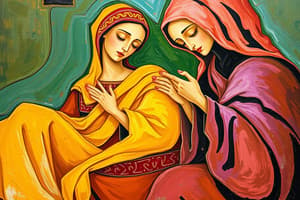Podcast
Questions and Answers
Midwives were crucial in childbirth, assisting mothers and ensuring safe ______.
Midwives were crucial in childbirth, assisting mothers and ensuring safe ______.
deliveries
They possessed knowledge of childbirth practices, maternal care, and herbal ______.
They possessed knowledge of childbirth practices, maternal care, and herbal ______.
remedies
Midwives often held a respected position within society, as they were vital to population ______.
Midwives often held a respected position within society, as they were vital to population ______.
continuity
Their roles sometimes involved navigating complex societal and legal ______, particularly in oppressive regimes.
Their roles sometimes involved navigating complex societal and legal ______, particularly in oppressive regimes.
Midwives were seen as guardians of birth and life, often celebrated in various ______, including Ancient Egyptian society.
Midwives were seen as guardians of birth and life, often celebrated in various ______, including Ancient Egyptian society.
The work of midwives was sometimes seen as divine, connecting them to goddesses associated with ______ and childbirth.
The work of midwives was sometimes seen as divine, connecting them to goddesses associated with ______ and childbirth.
In Ancient Egypt, midwives played a significant role in the process of ______.
In Ancient Egypt, midwives played a significant role in the process of ______.
Cultural significance as caregivers made midwives an essential part of ______ communities.
Cultural significance as caregivers made midwives an essential part of ______ communities.
Flashcards are hidden until you start studying
Study Notes
Shiphrah and Puah
-
Identity: Shiphrah and Puah are named midwives in the Book of Exodus in the Hebrew Bible.
-
Role: They served as midwives to the Hebrew women during their childbirth.
-
Historical Context:
- Their story is set in Ancient Egypt, during a time of oppression for the Hebrew people.
- Pharaoh issued a decree to kill Hebrew male infants to control the population.
-
Defiance of Pharaoh:
- Both midwives feared God and refused to follow Pharaoh's orders.
- They allowed Hebrew boys to live, demonstrating moral courage and resistance against tyranny.
-
Cunning Response:
- When questioned by Pharaoh, they explained that Hebrew women gave birth too quickly for them to intervene, thereby evading responsibility.
-
Consequences:
- Their actions pleased God, who rewarded them by establishing families for them.
Midwives in Ancient Egypt
-
Function:
- Midwives were crucial in childbirth, assisting mothers and ensuring safe deliveries.
-
Training and Knowledge:
- They possessed knowledge of childbirth practices, maternal care, and herbal remedies.
-
Social Status:
- Midwives often held a respected position within society, as they were vital to population continuity.
-
Legal and Ethical Issues:
- Their roles sometimes involved navigating complex societal and legal pressures, particularly in oppressive regimes.
-
Cultural Significance:
- Midwives were seen as guardians of birth and life, often celebrated in various cultures, including Ancient Egyptian society.
-
Religious Aspects:
- The work of midwives was sometimes seen as divine, connecting them to goddesses associated with fertility and childbirth.
Shiphrah and Puah
- Identified as Hebrew midwives in the Book of Exodus.
- Provided support to Hebrew women during childbirth in Ancient Egypt.
- Their narrative unfolds amidst oppression faced by the Hebrew population in Egypt.
- Pharaoh mandated the killing of Hebrew male infants to suppress their growth.
- Displayed moral courage by fearing God and refusing to comply with the decree.
- Enabled the survival of Hebrew boys, showcasing resistance against oppressive authority.
- When confronted by Pharaoh, they cleverly claimed that Hebrew women birthed too rapidly for their assistance.
- Their actions garnered divine favor, resulting in God establishing families for them.
Midwives in Ancient Egypt
- Essential in childbirth, ensuring the safety and wellbeing of mothers and infants.
- Equipped with knowledge of childbirth methodologies, maternal care, and herbal treatments.
- Enjoyed a respected societal status due to their pivotal role in sustaining populations.
- Navigated legal and ethical challenges, particularly in oppressive governmental structures.
- Celebrated in various cultures as vital guardians of life and childbirth.
- Often associated with divine elements, linking their work to goddesses of fertility and childbirth.
Studying That Suits You
Use AI to generate personalized quizzes and flashcards to suit your learning preferences.


